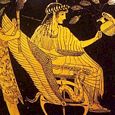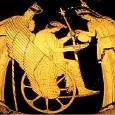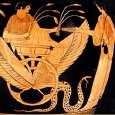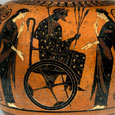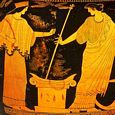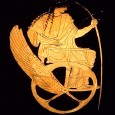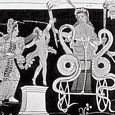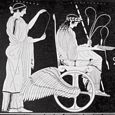TRIPTOLEMOS
Greek Name
Τριπτολεμος
Transliteration
Triptolemos
Latin Spelling
Triptolemus
Translation
Pounding Husks
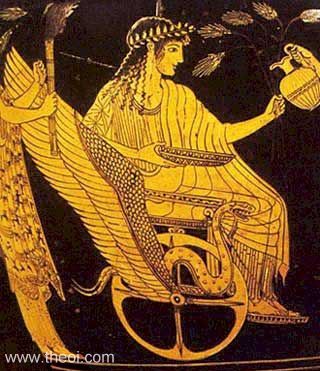
TRIPTOLEMOS (Triptolemus) was a demi-god of the Eleusinian mysteries who presided over the sowing of grain-seed and the milling of wheat.
He was one of the Eleusinian princes who hospitably received the goddess Demeter when she was mourning the loss of her daughter. After Persephone was returned from the underworld Demeter, in her munificence, instructed Triptolemos in the ways of agriculture and provided him with a winged, serpent-drawn chariot to spread her gift across the earth. He travelled through many lands but when he reached the cold realm of the Skythians, King Lynkos (Lyncus) slew one of his dragon-serpents and drove the hero away. Deventer transformed the king into a lynx and denied the Skythians the gift of agriculture.
In ancient Greek vase painting Triptolemos is usually depicted seated on his winged chariot in the company of the goddesses Demeter, Persephone and Hekate. He also appears amongst larger gatherings of the Eleusinian gods.
Triptolemos' name is derived from the Greek words triptos and lemma meaning "He who Pounds the Husks."
FAMILY OF TRIPTOLEMUS
PARENTS
[1.1] OKEANOS & GAIA (Pherecydes Frag, Musaeus Frag, Apollodorus 1.32, Pausanias 1.14.3)
[2.1] TROKHILOS & ELEUSIS (Pausanias 1.14.2)
[3.1] ELEUSIS & METANEIRA (Panyasis Frag, Apollodorus 1.32)
[4.1] KELEOS (Pausanias 1.14.3, Suidas s.v. Rharias)
[4.2] KELEOS & METANEIRA (Ovid Fasti 4.510)
[5.1] DYSAULES (Orphic Frag, Pausanias
1.14.3)
[6.1] RHAROS & DAUGHTER OF AMPHIKTYON (Cheorilus Frag, Pausanias 1.14.3)
[7.1] ELEUSINOS & KOTHONEA (Hyginus Fabulae 147)
ENCYCLOPEDIA
TRIPTO′LEMUS (Triptolemos), a son of Celeus and Metaneira or Polymnia, or according to others, a son of king Eleusis by Cothonea (or Cyntinea or Hyona, Serv. ad Virg. Georg. i. 19 ; Schol. ad Stat. Theb. ii. 382.) Others again describe him as a son of Oceanus and Gaea, as a younger brother or relation of Celeus, as a son of Trochilus by an Eleusinian woman, as a son of Rharus by a daughter of Amphictyon, or lastly, as a son of Dysaules. (Hygin. Fab. 147; Apollod. i. 5. § 2, Paus. i. 14. § 2; Hom Hymn. in Cer. 153.) Triptolemus was the favourite of Demeter, and the inventor of the plough and agriculture, and of civilisation, which is the result of it. He was the great hero in the Eleusinian mysteries. (Plin. H. N. vii. 56; Callim. Hymn. in Cer. 22 ; Virg. Georg. i. 19.) According to Apollodorus, who makes Triptolemus a son of Celeus and Metaneira, Demeter, on her arrival at Eleusis in Attica, undertook as nurse the care of Demophon, a brother of Triptolemus. who had just been born. In order to make the child immortal, Demeter at night put him into a fire, but as Metaneira on discovering the proceeding, screamed out, the child was consumed by the flames. As a compensation for this bereavement, the goddess gave to Triptolemus a chariot with winged dragons and seeds of wheat. According to others Triptolemus first sowed barley in the Rharian plain, and thence spread the cultivation of grain all over the earth; and in later times an altar and threshing floor of Triptolemus were shown there. (Paus. i. 38. § 6.) In the Homeric hymn on Demeter, Triptolemus is described as one of the chief men of the country, who like other nobles is instructed by Demeter in her sacred worship (123, 474, &c.); but no mention is made of any relationship between him and Celeus. In the tradition related by Hyginus, who makes Triptolemus a son of Eleusis, Triptolemus himself was the boy whom the goddess wished to make immortal. Eleusis, who wats watching her, was discovered by her and punished with instant death. (Ov. Trist. iii. 8. 2.) Triptolemus, after having received the dragon-chariot, rode in it all over the earth, making man acquainted with the blessings of agriculture. (Comp. Paus. vii. 18. § 2, viii. 4. § 1; Ov. Met. v. 646, &c.) On his return to Attica, king Celeus wanted to kill him, but by the command of Demeter he was obliged to give up his country to Triptolemus, which he now called after his father Eleusis. He now established the worship of Demeter, and instituted the Thesmophoria. (Hygin. Fab. 147 ; comp. Dionys. Hal. i. 12; Ov. Fast. iv. 507, &c.) He had temples and statues both at Eleusis and Athens (Paus. i. 14. § 1. 38. § 6.) Triptolemus is represented in works of art as a youthful hero, sometimes with the petasus, on a chariot drawn by dragons, and holding in his hand a sceptre and corn ears.
Source: Dictionary of Greek and Roman Biography and Mythology.
CLASSICAL LITERATURE QUOTES
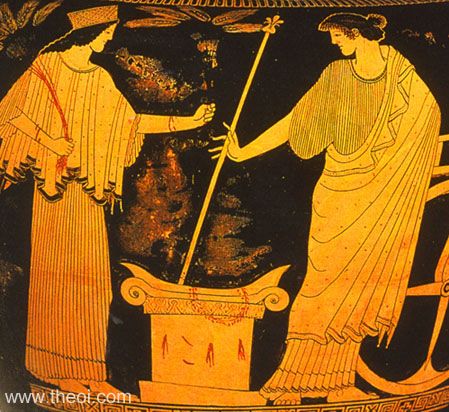
Homeric Hymn 2 to Demeter 145 ff (trans. Evelyn-White) (Greek epic C7th or 6th B.C.)
:
"[Princess Kallidike (Callidice) of Eleusis addresses the goddess Demeter disguised as an old woman :]
‘But now I will teach you clearly, telling you the names of men who have great power and honour here [in
Eleusis] and are chief among the people, guarding our city's coif of towers by their wisdom and true judgements
: there is wise Triptolemos and Dioklos (Dioclus) and Polyxeinos and blameless Eumolpos and Dolikhos (Dolichus)
and our own brave father [King Keleos (Celeus)].’"
Homeric Hymn 2 to Demeter 470 ff :
" [Following the return of Persephone from the underworld Demeter builds her temple at Eleusis :] Then she
went, and to the lords [or Eleusis] who deal justice, Triptolemos and Diokles (Diocles), the horse-driver, and
to doughty Eumolpos and Keleos (Celeus), leader of the people, she showed the conduct of her rites and taught
them all her mysteries, to Triptolemos and Polyxeinos and Diokles also,--awful mysteries which no one may in any
way transgress or pry into or utter, for deep awe of the gods checks the voice. Happy is he among men upon earth
who has seen these mysteries; but he who is uninitiate and who has no part in them, never has lot of like good
things once he is dead, down in the darkness and gloom."
Pseudo-Apollodorus, Bibliotheca 1. 32 (trans. Aldrich) (Greek mythographer C2nd A.D.)
:
"For Triptolemos, the elder of Metaniera's sons, Demeter prepared a chariot of winged Drakones (Dragons),
and she gave him wheat, which he scattered all over the populated earth as he was carried along through the sky.
Panyasis [Greek writer C5th B.C.] says that Triptolemos was the son of Eleusis, which is why Demeter came to
him; but Pherekydes (Pherecydes) [C6th B.C.] says that he was born of Okeanos (Oceanus, the World-River) and Ge
(Gaea, the Earth)."
Plato, Apology 41a (trans. Lamb) (Greek philosopher C4th B.C.) :
"For if a man when he reaches the other world, after leaving behind these who claim to be judges, shall
find those who are really judges who are said to sit in judgment there, Minos and Rhadamanthys, and Aiakos
(Aeacus) and Triptolemos, and all the other demigods who were just men in their lives, would the change of
habitation be undesirable?"
Callimachus, Hymn 6 to Demeter 17 ff (trans. Mair) (Greek poet C3rd B.C.)
:
"She [Demeter] was the first to cut straw and holy sheaves of corn-ears and put in oxen to tread them, what
time Triptolemos was taught the good craft."
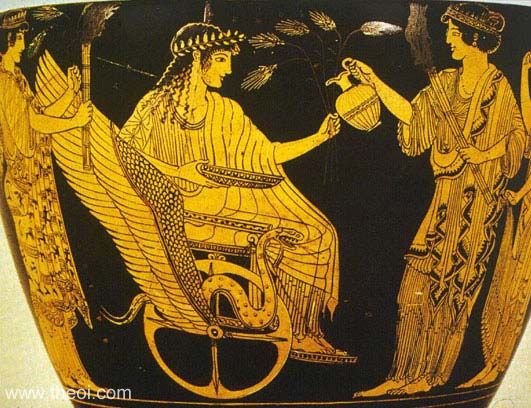
Strabo, Geography 14. 5. 12 (trans. Jones) (Greek geographer C1st B.C. to C1st A.D.)
:
"As for Tarsos (Tarsus) [in Asia Minor], it lies in a plain; and it was founded by the Argives who wandered
with Triptolemos in quest of Io."
Pausanias, Description of Greece 1. 14. 2 (trans. Jones) (Greek travelogue C2nd A.D.)
:
"Above the spring [of Peisistratos (Pisistratus) in Athens] are two temples, one to Demeter and Kore (Core)
[Persephone], while in that of Triptolemos is a statue of him.
The accounts given of Triptolemos I shall write, omitting from the story as much as relates to Deiope . . .
It is said, then, that when Demeter came to Argos she was received by Pelasgos (Pelasgus) into his home, and
that Khrysanthis (Chrysanthis), knowing about the rape of Kore (Core) [Persephone], related the story to her.
Afterwards Trokhilos (Trochilus), the priest of the Mysteries, fled, they say, from Argos because of the enmity
of Agenor, came to Attika and married a woman of Eleusis, by whom he had two children Eubouleus (Eubulus) and
Triptolemos. That is the account given by the Argives.
But the Athenians and those who with them . . ((lacuna)) know that Triptolemos, son of Keleos (Celeus), was the
first to sow seed for cultivation.
Some extant verses of Musaios (Musaeus), if indeed they are to be included among his works, say that Triptolemos
was the son of Okeanos (Oceanus) and Ge (Gaea, the Earth); while those ascribed to Orpheus . . . say that
Eubouleus and Triptolemos were sons of Dysaules, and that because they gave Demeter information about her
daughter the sowing of seed was her reward to them. But Kheorilos (Cheorilus), an Athenian, who wrote the play
called Alope, says that Kerkyon (Cercyon) and Triptolemos were brothers, that their mother was the
daughter of Amphiktyon (Amphictyon), while the father of Triptolemos was Rharos, of Kerkyon (Cercyon),
Poseidon.
After I had intended to go further into this story, and to describe the contents of the sanctuary at Athens,
called the Eleusinion (Eleusinium), I was stayed by a vision in a dream. I shall therefore turn to those things
it is lawful to write of to all men."
Pausanias, Description of Greece 7. 18. 2 :
"When Triptolemos came from Attika, he [Eumelos of Patrai (Patrae) in Akhaia (Achaea)] received from him
cultivated corn, and, learning how to found a city, named it Aroe from the tilling of the soil. It is said that
Triptolemos once fell asleep, and that then Antheias, the son of Eumelos, yoked the Drakones (Dragons) to the
car of Triptolemos and tried to sow the seed himself. But Antheias fell off the car and was killed, and so
Triptolemos and Eumelos together founded a city, and called it Antheia after the son of Eumelos."
Pausanias, Description of Greece 1. 38. 6 :
"The Eleusinians [at Eleusis] have a temple of Triptolemos . . . Here [on the sacred corn plain of Rharion]
is shown a threshing-floor called that of Triptolemos and an altar."
Pausanias, Description of Greece 8. 4. 1 :
"Nyktimos (Nyctimus) [king of Arkadia (Arcadia)] introduced the cultivation of crops, which he learned from
Triptolemos."
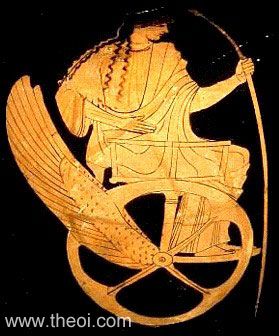
Diodorus Siculus, Library of History 5. 68. 1 (trans. Oldfather) (Greek historian
C1st B.C.) :
"Now she [Demeter] discovered the corn before she gave birth to her daughter Persephone, but after the
birth of her daughter and the rape of her by Plouton (Pluton) [Haides], she burned all the fruit of the corn,
both because of her anger at Zeus and because of her grief over her daughter. After she had found Persephone,
however, she became reconciled with Zeus and gave Triptolemos the corn to sow, instructing him both to share the
gift with men everywhere and to teach them everything concerned with the labour of sowing."
Pseudo-Hyginus, Fabulae 147 (trans. Grant) (Roman mythographer C2nd A.D.)
:
"When Ceres [Demeter] was hunting for her daughter, she came to King Eleusinus, whose wife Cothonea had
borne the boy Triptolemus . . . On Triptolemus she [Demeter] conferred everlasting honour, for she gave him her
chariot yoked with Serpents to spread the cultivation of grain. Riding in it he sowed grain throughout the
earth. When he returned, Celeus bade him be killed for his benefactions, but when this was known, by Ceres'
order he gave the kingdom to Triptolemus, who called it Eleusis from his father's name. He also established
sacred rites in honour of Ceres, which hare called in Greek Thesmophoria."
Pseudo-Hyginus, Fabulae 277 :
"[Demeter] taught her foster-son Triptolemus to sow grain. When he had sown it, and a pig rooted up what he
had planted, he seized the pig, took it to the altar of Ceres [Demeter], and putting grain on its head,
sacrificed it to Ceres. From this cam the custom of putting salted meal on the victim."
Pseudo-Hyginus, Astronomica 2. 14 (trans. Grant) (Roman mythographer C2nd A.D.)
:
"Serpent-Holder [constellation Ophiuchus] . . . [Karnabon (Carnabon) king of the Getae of Thrace] came into
power at the time when it is thought grain was first given to mortals. For when Ceres [Demeter] was distributing
her bounties to men, she bade Triptolemus, whose nurse she had been, go around to all the nations and distribute
grain, so that they and their descendants might more easily rise above primitive ways of living. He went in a
Draco (Dragon) car, and is said to have been the first to use one wheel, so as not to be delayed in his journey.
When he came to the king of the Getae, whom we mentioned above, he was at first hospitably received. Later, not
as a beneficent and innocent visitor, but as a most cruel foe, he was seized by treachery, and he who was ready
to prolong the lives of others, almost lost his own life. For at the order of Carnabon one Draco (Dragon) was
killed, so that Tiptolemus might not hope his Draco car could save him when he realized an ambush was being
prepared. But Ceres is said to have come there, and restored the stolen chariot to the youth, substituting
another Draco, and punishing the king with no slight punishment for his malevolent attempt. For Hegesianax
[Greek writer C2nd B.C.] says that Ceres, for men's remembrance, pictures Carnabon among the stars, holding a
Draco in his hands as if to kill it. He lived so painfully that he brought on himself a most welcome
death."
Pseudo-Hyginus, Fabulae 2. 22 :
"[Constellation Gemini :] Others have called them Triptolemus, whom we mentioned before, and Iasion,
beloved of Ceres [Demeter]--both carried to the stars."
Ovid, Metamorphoses 5. 643 ff (trans. Melville) (Roman epic C1st B.C. to C1st A.D.)
:
"Bounteous Ceres [Demeter] yoked her Serpent-Pair (angues gemini) to her chariot, and fixed the
curbing bits and made her way between the earth and sky to Tritonia's city [Athens], and brought the chariot to
Triptolemus, and brought the chariot to Triptolemus, and gave him seed and bade him scatter it. Partly in virgin
land and part in fields long fallow. Scouring high the young prince rode through Europe and the realms of Asia
till he came to Scythia, where Lyncus ruled, and entered the king's palace. Lyncus asked how he had come, his
journey's cause, his name and country. ‘Famous Athens is my country,’ he answered, ‘and my
name is Triptolemus. No sail brought me by sea, nor foot by land, the sky lay wide to give me way. I bring the
gifts of Ceres [Demeter]. If you sow them wide over your ploughland, they will give you back bountiful harvests,
gentle nourishment.’
That barbarous king was jealous, and to gain himself the credit for that gift so great lavished his hospitality,
and when his guest was sunk in sleep, attacked him with a dagger. As he tried to stab his heart, Ceres [Demeter]
transformed the king into a lynx; then bade the youth of Mopsosius [Triptolemos] drive her pair of Sacred
Serpents (Iugales Sacri) homeward through the air."
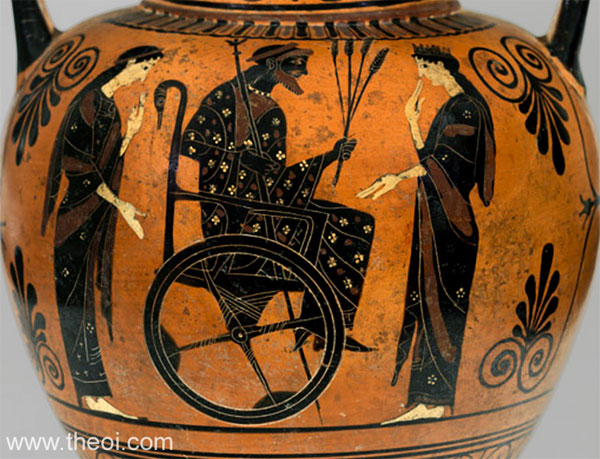
Ovid, Fasti 4. 510 ff (trans.Boyle) (Roman poetry C1st B.C. to C1st A.D.)
:
"[Demeter arrived in Eleusis during her search for Persephone :] [In the house of Keleus (Celeus)] a baby
son [Triptolemos] lay sick in a cot . . . [Celeus offered Demeter hospitality]. Crossing the threshold [of the
house], she sees everything steeped in tears: no hope remained for the boy's health. She greeted the mother--her
name was Metanira--, and saw fit to place her mouth on the boy's. Pallor goes, they see sudden strength in the
body; such vitality came from divine lips. The entire house rejoiced, that is, mother, father and daughter: the
three were the entire house. They quickly lay out a feast: curds dissolved in milk, apples, and golden honey in
its combs. Gentle Ceres abstains and offers you warm milk to drink, child, with sleep-inducing poppies. It was
midnight and peaceful sleep's silent hour. She took Triptolemus into her lap, and stroked him three times with
her hand, uttered three spells, spells which a mortal voice may not repeat, and buried the child's body in the
hearth's living embers to purge his human dross with fire. His foolishly loving mother wakes, crazily roars
‘What are you doing?’ and rips him from the fire. The goddess said : ‘You're not criminal,
your action was. Your motherly fear has cancelled my gift. He will stay mortal, but will be the first to plough
and sow and reap rewards from the tilled soil.’ She spoke, and left wrapped in a cloud. She finds her
Serpents and flies up high in her winged chariot."
Virgil, Georgics 1. 19 (trans. Fairclough) (Roman bucolic C1st B.C.) :
"Youth [Triptolemus], who showed to man the crooked plough."
Pliny the Elder, Natural History 7. 199 (trans. Rackham) (Roman encyclopedia C1st
A.D.) :
"[On inventions :] The ox and the plough [were invented] by Buzyges (Ox-Yoker) of Athens, or, as others
say, by Triptolemus."
Seneca, Phaedra 838 ff (trans. Miller) (Roman tragedy C1st A.D.) :
"Now for the fourth time is Eleusis harvesting the bounty of Triptolemus, as many times has Libra made day
equal unto night."
Valerius Flaccus, Argonautica 1. 68 ff (trans. Mozley) (Roman epic C1st A.D.)
:
"The fabled team of Dracones of him [Triptolemos] who first set the mark of the ploughshare upon lands that
knew not Ceres [Demeter], and preferred the golden ear to the acorn."
Statius, Silvae 4. 2. 35 (trans. Mozley) (Roman poetry C1st A.D.) :
"Bounteous were the gliding wheels of airy Triptolemus."
Nonnus, Dionysiaca 13. 188 ff (trans. Rouse) (Greek epic C5th A.D.) :
"Those born of the blood of Triptolemos [i.e. the priests of the Eleusinian Mysteries]: who once [flew]
through the air, with his load of cornears, and lashed the serpents' backs."
Suidas s.v. Rharias (trans. Suda On Line) (Byzantine Greek Lexicon C10th A.D.)
:
"Rharias : Demeter. For Rharos had a son Keleos (Celeus), who had a son Triptolemos. Rharos received
Demeter, as she wandered about looking for Kore (Core) [Persephone], into his house. In gratitude, Demeter
taught Triptolemos, the grandson of Rharos, the farming of grain. And she provided him a chariot of winged
Drakones (Dragons), traveling in which Triptolemos went all about the earth, teaching the farming of
grain."
ANCIENT GREEK ART
SOURCES
GREEK
- The Homeric Hymns - Greek Epic C8th - 4th B.C.
- Plato, Apology - Greek Philosophy C4th B.C.
- Apollodorus, The Library - Greek Mythography C2nd A.D.
- Callimachus, Hymns - Greek Poetry C3rd B.C.
- Diodorus Siculus, The Library of History - Greek History C1st B.C.
- Strabo, Geography - Greek Geography C1st B.C. - C1st A.D.
- Pausanias, Description of Greece - Greek Travelogue C2nd A.D.
- Nonnus, Dionysiaca - Greek Epic C5th A.D.
ROMAN
- Hyginus, Fabulae - Latin Mythography C2nd A.D.
- Hyginus, Astronomica - Latin Mythography C2nd A.D.
- Ovid, Metamorphoses - Latin Epic C1st B.C. - C1st A.D.
- Ovid, Fasti - Latin Poetry C1st B.C. - C1st A.D.
- Virgil, Georgics - Latin Bucolic C1st B.C.
- Pliny the Elder, Natural History - Latin Encyclopedia C1st A.D.
- Seneca, Phaedra - Latin Tragedy C1st A.D.
- Valerius Flaccus, The Argonautica - Latin Epic C1st A.D.
- Statius, Silvae - Latin Poetry C1st A.D.
BYZANTINE
- Suidas, The Suda - Byzantine Greek Lexicon C10th A.D.
BIBLIOGRAPHY
A complete bibliography of the translations quoted on this page.
